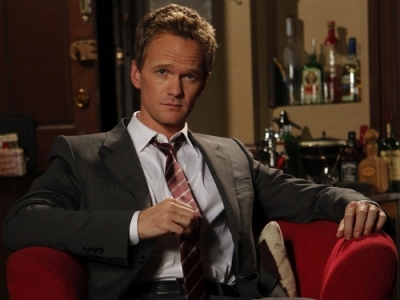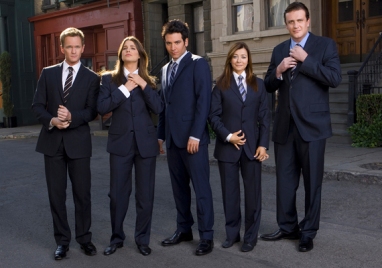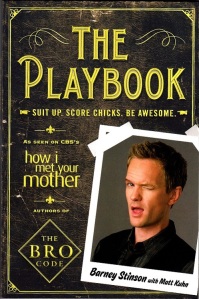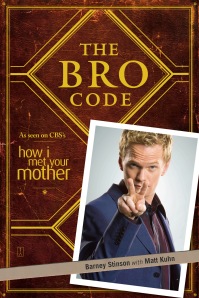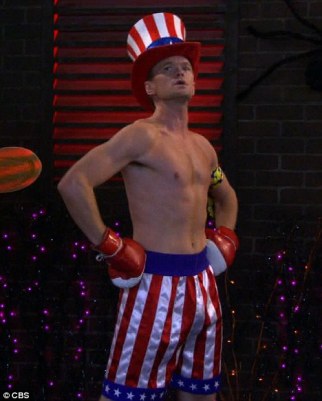The example that I chose for masculinity in popular culture is a character from a TV show that I loved a lot during its 8-season run (except for the last season and finale, but that’s a different conversation altogether). Barney Stinson in How I Met Your Mother is a hilarious character with the best quotes and songs throughout the series. I personally love the actor, Neil Patrick Harris, and admire his talent and beautiful family. Fortunately, the character he plays on the show is the complete opposite of him in real life, and he does a great job bringing the outrageous Barney Stinson to life.
Barney Stinson is a character of hyper-masculinity on this show who is a rich, suit-wearing womanizer. In every episode, Barney tries to sleep with as many women as possible; he even keeps a list and in one episode, he hits number 200.
Barney (Neil Patrick Harris) is such a detailed character who infamously only wears suits and specifically targets women with “daddy issues.” After a particularly rough breakup as a young, sensitive man with a girl named Shannon, Barney, feeling devastated and vulnerable, receives advice from the man who stole his girlfriend to wear suits and be a man. As Barney himself states, the purpose of wearing suits is “to distinguish ourselves from the millions of T-shirt and jeans lemmings out there.” He has a closet full only of suits and even sings an entertaining song in an episode entitled Girls versus Suits about choosing his suits over women. Barney popularized the saying, “Suit up!” during the entirety of the show, constantly pressuring his friends- especially Ted- to wear suits, look good, and get laid. Not only does his seemingly unlimited amount of money (though we never actually learn what his job is, though it’s apparently extremely important and high-up in status) supply the best suits custom-made by guest star Tim Gunn, but he lives in the ultimate “bachelor pad,” fit with an entire TV wall, gray and black tones, a fake kitchen, an entire wall featuring his porn collection, and a Stormtrooper from Star Wars. In fact, his New York apartment is so “manly” and sterile, that when Lily (Alyson Hannigan), his friend and wife of Marshall (Jason Segel), stays with Barney for a few days, she tries to make it more homey to “seem like a girl would actually live here.” Barney explains that the main purpose for his apartment is to be so manly as to tell a one-night-stand to leave after she wakes up in the morning. Because apparently, this is every man’s “dream.”
Barney was raised by a single mom and doesn’t meet his father until late adulthood, and he has a gay, black brother named James (Wayne Brady). He lives by The Playbook, a book in which he includes “every scam, con, gambit, flimflam, stratagem, and bamboozle” to pick up women and get them to sleep with him. The “plays” range from clever, thought-out scenarios and schemes, as well as more stupid, simpler lies to get a woman into bed. Barney also popularizes what is called The Bro Code, which instructs men on how to be “bros.” Because these books became so popular on the show, real editions were created and sold to fans; anyone can pick up a copy of The Bro Code on Amazon and learn how to “be a bro.”
Despite Barney having some very unique personality quirks and talents, such as his ability to do magic (based on Neil Patrick Harris’s real passion for magic) and his constant need to sing a lot, he is hyper-masculine on the show. Not only does he lie to and sleep with as many women as possible, but he also has an amazing body and is extremely patriotic. In his article Advertising and the Construction of Violent White Masculinity, Jackson Katz discusses how masculinity in popular culture and advertising “help support the equation of white masculinity and violence: the angry, aggressive, white working-class male as anti-authority rebel; violence as genetically programmed male behavior; the use of military and sports symbolism to enhance the masculine appeal and identification of products; and the association of muscularity with ideal masculinity.” I believe that all four of these characteristics can be applied to Barney Stinson’s character, though perhaps in ways that slightly differ from other pop culture texts.
1. The Angry, Aggressive, White Working-Class Male as Anti-Authority Rebel (21st Century Version)
For the first theme of masculinity according to Katz, Barney is a wealthy, white man in an important executive position at work. Although most viewers would probably say that Barney isn’t always angry and is rarely aggressive (in many instances, he’s the opposite and merely uses the confident “tough guy” routine as an act), there have been instances on the show when he aggressively lashes out. In one episode, Ted (Josh Radnor) and Marshall break up Lily and Robin (Cobie Smulders) when they’re fighting, and Barney becomes so enraged that they broke up a “girl fight” that he punches a hole in the apartment wall. He also gets into a fight with Ted and Marshall in another episode, though he ends up running away instead of fighting. Barney does resist authority, but does it in a way that is more manipulative and scheming; instead of outright resisting or demeaning authority, he plays certain situations to his advantage and discredits individuals above him. He does this at work to get what he wants, and rejects men in important roles because of his issues with his absent father. We as viewers do see a sensitive side to Barney when it comes to his relationships with his mother and father, but for the most part, he remain aggressive and angry with his dad for walking out on them. This feeling continues, despite him primarily being a very happy, positive character.
2. Violence as Genetically Programmed Male Behavior
While I did mention in the last theme of masculinity that Barney shows some examples of aggressiveness, for the most part his character is very passive. He tends to be more of a fire-starter in creating aggressive situations rather than directly participating in them. As a child and young adult, Barney was an awkward person who was often picked on and taken advantage of; his suit-wearing, women-conquering adult persona is a rejection of his past to “be awesome” (a phrase commonly said by Barney- “When I feel sad, I stop being sad and be awesome instead. True story.”).
3. The Use of Military and Sports Symbolism to Enhance the Masculine Appeal and Identification of Products
While Barney doesn’t necessarily play sports, he creates an entire resume video depicting him doing amazing things- without actually having to do them. He tries to create the allusion that he is a “guys’ guy” who is masculine and take-charge without needing to exhibit all of these qualities. He frequently dresses up in costumes for his Playbook plays and Halloween parties, including a pilot, a solider, and an American boxer. He prefers wearing suits and performing the “executive role” over an athletic one, but in How I Met Your Mother, he does use military and sports symbolism in his acts.
4. The Association of Muscularity with Ideal Masculinity
Looking at Barney Stinson, viewers might not necessarily think that he is particularly muscular. In fact, sometimes he appears thin and even weak. However, his body is shown multiple times on the show- in costumes and when he’s in bed with women- and his muscles are in full view. He’s not over-muscular or “built,” but he represents a pretty regular white guy with money who lives an incredible life of constantly having sex (his “workout”), drinking, and being young. Especially compared to Marshall, who is taller and much bigger, and Ted, who is a regular architecture professor, Barney is the ultimate “catch.”
True story.
Using Kidd’s cultural diamond, I think it’s important to analyze Barney Stinson’s character as a text. His character is hilarious and highly quotable, but he is also marketable to both men and women. Not only are The Playbook, The Bro Code, and many of his clothing items and quotes for sale online, but his persona is being sold by the creators (the directors, writers, and producers of the show) with each episode. The TV show often makes fun of his hyper-masculinity but never actually addresses it as being a negative thing, and in the finale, he loses all character development in marrying Robin (which took up the entire final season) when they divorce five minutes later. He reverts back to his previous womanizing personality and never actually changes at all, proving to male and female viewers (the receivers of this text) that not only is this type of behavior acceptable, but it gets you what you want- respect… and sex. I think this is only promoting the modern “hookup culture” we have in society today, where it’s totally okay to “be a man” by sleeping with women, lying consistently, and being both aggressive and manipulative. Is this really the message we want to send about what it means to be masculine?
